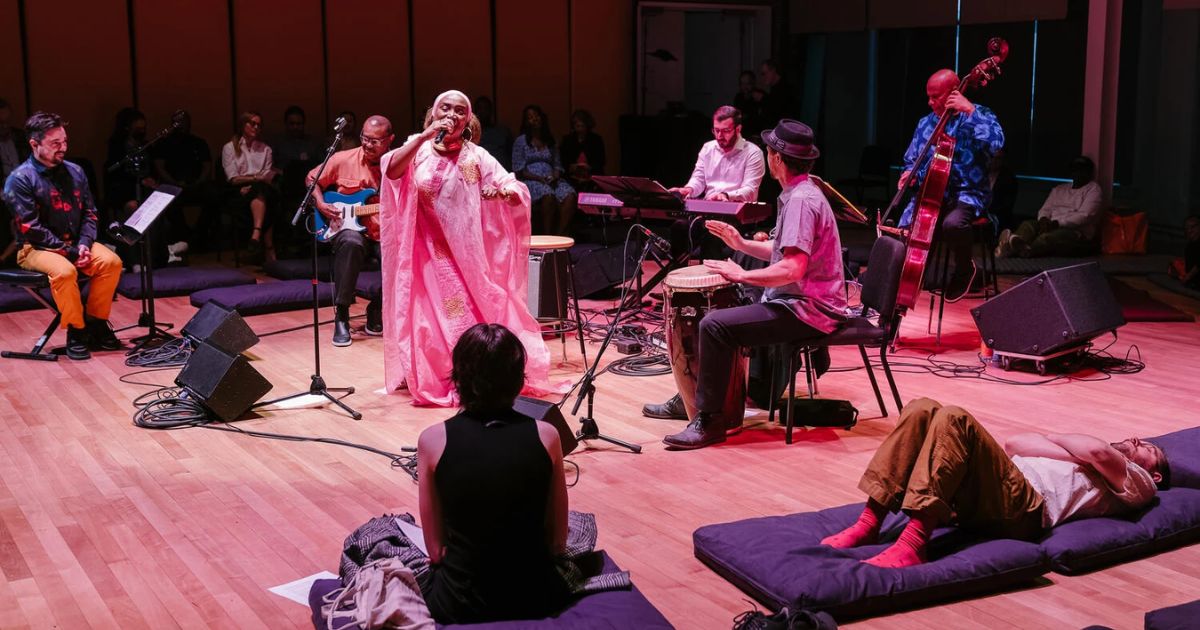The Carnegie Hall is embarking on a groundbreaking series of therapies aimed at improving mental health through a revolutionary series of Well-Being Concerts.
Unlike the typical concert atmosphere, these events aim to entertain people while providing them with health benefits.
This program was created by Sarah Johnson, who heads the Weill Music Institute (WMI) at Carnegie Hall.
To leverage music’s inherent therapeutic potential, Johnson decided to design immersive encounters that enhance the health value of live performances.
The primary purpose of these concerts is to change the traditional experience for an audience.
There are floor cushions or yoga mats for visitors to use, which makes the space inviting and comfortable.
Instead of keeping silence in the room, organizers promote networking during such events.
A more intimate and connected experience is facilitated by soft lighting and a circular seating arrangement around musicians.
Featuring 16 Well-Being Concerts tailored for various audiences including healthcare workers, veterans and individuals affected by justice system; this happened earlier this month when they were launched.
They create a place where people can get as much healing power from music as possible.
Sarah Elizabeth Charles with pianist Jarrett Cherner kicked off one of the concerts playing songs from their album “Tone” which they had come up with during the pandemic.
The audience deeply connected with her regarding their practices of mindfulness and loving kindness.
What sets these concerts apart is that when you attend them it feels like you’re standing right in them.
Unlike professional music acts whose stage is elevated above attendees, here participants surround performers creating a feeling of unity among themselves.
According to Johson,” We’re trying to really hold the space for the audience to have as fruitful an experience as possible during the performance.” I think it’s a really cool way to dig into what content means.”
The initial pilot concerts held earlier for healthcare providers and those impacted by the justice system received an overwhelmingly positive response.
Throughout and after these proceedings, there was significant reduction in stress levels and elevated moods among the audience.
During this period when global events have magnified mental health challenges, such a series is timely.
The organizers however recognize the need for constant follow-up and are working on ways to extend beyond the concert.
Some of these extension programs include playlists by the performers and recordings of their performances that attendees can get after attending the concert.
The significance of music within therapeutic settings is emphasized by Ian Koebner who was a strategic advisor in this project.
Using his background in healthcare leadership and arts-based conflict resolution, Koebner showed how reflective group listening in concerts can affect physiological, psychological and social well-being positively.
He emphasizes that music has an effect on reducing stress hormones, anxiety and depression.
The Well-Being Concerts are different from other Carnegie Hall programs as they use music as a therapy.
In addition to concert halls, such programs as Musical Connections in correctional facilities and Lullaby Project for expecting families demonstrate how transformative power of music exists today in many communities worldwide.
As the concert’s research program extends to institutions like UC Berkeley’s Berkeley Social Interaction Lab, Carnegie Hall aims at evaluating the effect of these concerts in a rigorous manner.
Dacher Keltner, a psychology lecturer, and his team will conduct a randomized controlled trial to determine if concerts affect people’s well-being.
Johnson reflects on what all this means holistically and states that “We’re changed by it. We have this work where there can be 360 degrees of impact.”
However, even though the first response has been good for the Well-Being Concerts, it is important to recognize that mental health challenges do not go away.
The main concern is finding ways to maintain the positive aspects and offer continuing support for concert-goers beyond the hallways of performance spaces.
At one such concert’s climax, Charles and Cherner take the audience through a collective performance where they repeat refrains that sum up what they had just experienced: “Be here and now, living life out loud.”
When Carnegie Hall embarked on using music as a catalyst for well-being among people with mental health problems, it was pioneering an attempt at creating inclusive healing spaces through music which is universally understood.






